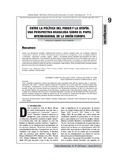Mostrar el registro sencillo del ítem
Entre la política de poder y la utopía: una perspectiva brasilera sobre el papel internacional de la Unión Europea
| dc.rights.license | http://creativecommons.org/licenses/by-nc-sa/3.0/ve/ | |
| dc.contributor.author | Ribeiro Hoffmann, Andrea | |
| dc.date.accessioned | 2011-12-15T20:21:01Z | |
| dc.date.available | 2011-12-15T20:21:01Z | |
| dc.date.issued | 2011-12-15T20:21:01Z | |
| dc.identifier.issn | 1316-6727 | es_VE |
| dc.identifier.uri | http://www.saber.ula.ve/handle/123456789/34282 | |
| dc.description.abstract | Desde una perspectiva brasilera, históricamente Europa a estado asociada tanto con imágenes negativas –“colonizador”, “opresor”, el “Norte”, “fortaleza cerrada al comercio y la inmigración”- como con papeles positivos –“civilización”, “desarrollo”, “modelo a seguir”, “utopía”-. El presente artículo identifica esta pluralidad de roles y desarrolla tres reflexiones: 1) la percepción de Brasil sobre el papel internacional de la UE se define mejor como la coexistencia de dos tipos de roles: un gran poder en el sistema internacional y un modelo, una utopía para alcanzar; 2) el proceso de integración regional europeo y el desarrollo del concepto sobre la identidad europea han creado una oportunidad para terceros países de cambiar su percepción sobre Europa; 3) los acontecimientos recientes pueden llevar de nuevo hacia una percepción negativa. | es_VE |
| dc.language.iso | es | es_VE |
| dc.rights | info:eu-repo/semantics/openAccess | |
| dc.subject | Relaciones Brasil – Unión Europea; | es_VE |
| dc.subject | Política Exterior Brasilera | es_VE |
| dc.subject | Papel internacional de la Unión Europea | es_VE |
| dc.subject | Identidad Unión Europea | es_VE |
| dc.title | Entre la política de poder y la utopía: una perspectiva brasilera sobre el papel internacional de la Unión Europea | es_VE |
| dc.title.alternative | Between power politics and utopia: a brazilian point of view bout european union’s international roll | es_VE |
| dc.type | info:eu-repo/semantics/article | |
| dc.description.abstract1 | From a Brazilian perspective, Europe has historically been associated both with the negative roles of ‘colonizer’, ‘oppressor’, the ‘north’, a ‘fortress’ closed to trade and immigration, and, at the same time, with the positive roles of ‘civilization’, ‘development’, a ‘model’ to be followed, a ‘utopia’ to be achieved. The present article identifies this plurality of roles and advances three main arguments: that the Brazilian perception on the EU’s international role can be better defined as a coexistence of two role types: a greater power in the international system, and a model, a utopia to be achieved; that the process of regional integration in Europe and the development of the concept of a specific European identity has created an opportunity for 3rd countries to change their perception; and that recent developments might shift the prevailing Brazilian perception back to the previous one. | es_VE |
| dc.description.colacion | 9-18 | es_VE |
| dc.description.email | a.ribeiro-hoffmann@lse.ac.uk | es_VE |
| dc.description.frecuencia | semestral | es_VE |
| dc.identifier.depositolegal | 1996-02TA-3 | es_VE |
| dc.subject.facultad | Núcleo Táchira (NUTULA) | es_VE |
| dc.subject.keywords | Brazil-European Union relations | es_VE |
| dc.subject.keywords | Brazilian foreign policy | es_VE |
| dc.subject.keywords | European Union international role | es_VE |
| dc.subject.keywords | European Union identity | es_VE |
| dc.subject.publicacionelectronica | Aldea Mundo | es_VE |
| dc.subject.seccion | Aldea Mundo: Investigación | es_VE |
| dc.subject.thematiccategory | Artes y Humanidades | es_VE |
| dc.subject.tipo | Revistas | es_VE |
| dc.type.media | Texto | es_VE |
Ficheros en el ítem
Este ítem aparece en la(s) siguiente(s) colección(ones)
-
Aldea Mundo - Año 015. Nº 029
Enero- Junio 2010


